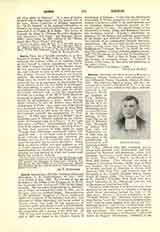

Azara, FINN DE.—a Spanish naturalist, b. at Barbunales in Aragon, May 18, 1746; d. 1811. He first embraced the military career as an engineer, distinguished himself in various expeditions, and rose to the rank of Brigadier General in the Spanish Army. He was appointed member of the Spanish commission sent to South America, in 1781, to settle the question of limits between the Portuguese arid Spanish colonies. He remained in South America till 1801. While there he turned his attention to the study of mammals, less as an anatomist or physiologist than as an observer of the life and habits of quadrupeds. His observations, to which he added a large number of statements obtained by hearsay, were not always favorably criticized, but today the perspicacity of Azara as a student of the life of South American mammals is generally acknowledged. He also extended his investigations to birds. Before leaving South America, he sent his brother (then Spanish Ambassador at Paris) many notes and observations of a zoological nature, which Moreau de Saint-Wry published at Paris in 1801 under the title of “Essay stir l’histoire naturelle des quadrupedes du Paraguay“. In 1802 there appeared at Madrid “Apuntamientos para la Historia natural de los cuadrdpedos del Paraguay y Rio de la Plata”. In the same year Azara published “Apuntamientos para la Historia de los pajaros del Paraguay y Rio de la Plata”. In 1809 there appeared at Paris under his name “Voyage dans l’Amerique meridionale depuis 1781 jusqu’en 1801”. In the latter work he criticizes the Jesuit methods of organizing and educating the Indians, showing that he completely failed to understand the nature of the American aborigines. Azara, while an efficient soldier and good engineer, as well as shrewd observer of animal life, was incapable of understanding the character of the Indian, and of grasping the only method by which the Indian could slowly but surely be civilized.
AD.F. BANDELIER

